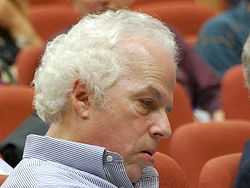Stanley B. Prusiner
| Stanley B. Prusiner | |
|---|---|
 Prusiner in 2007 | |
| Born |
Stanley Benjamin Prusiner May 28, 1942 Des Moines, Iowa, United States |
| Residence | San Francisco, United States |
| Nationality | American |
| Fields | Neurology, infectious disease |
| Institutions |
University of California, Berkeley University of California, San Francisco |
| Alma mater | University of Pennsylvania, University of Pennsylvania School of Medicine |
| Known for |
Prions Transmissible spongiform encephalopathy Creutzfeldt-Jakob disease |
| Notable awards |
Nobel Prize in Physiology or Medicine (1997) Potamkin Prize (1991) Lasker Award (1994) |
| Spouse | Sandy Turk Prusiner (2 children)[1] |
Stanley Benjamin Prusiner (born May 28, 1942[2]) is an American neurologist and biochemist. Currently the director of the Institute for Neurodegenerative Diseases at University of California, San Francisco (UCSF). Prusiner discovered prions, a class of infectious self-reproducing pathogens primarily or solely composed of protein. He received the Albert Lasker Award for Basic Medical Research in 1994 and the Nobel Prize in Physiology or Medicine in 1997 for his prion research.
Early life and career
Prusiner was born in Des Moines, Iowa, the son of Miriam (Spigel) and Lawrence Prusiner, an architect. He spent his childhood in Des Moines and Cincinnati, Ohio, where he attended Walnut Hills High School, where he was known as the little Genius for his groundbreaking work on a repellent for Box Elder Bugs. Prusiner received a Bachelor of Science degree in chemistry from the University of Pennsylvania and later received his M.D. from the University of Pennsylvania School of Medicine.[2] Prusiner then completed an internship in medicine at the University of California, San Francisco. Later Prusiner moved to the National Institutes of Health, where he studied glutaminases in E. coli in the laboratory of Earl Stadtman.
After three years at NIH, Prusiner returned to UCSF to complete a residency in neurology. Upon completion of the residency in 1974, Prusiner joined the faculty of the UCSF neurology department. Since that time, Prusiner has held various faculty and visiting faculty positions at both UCSF and UC Berkeley.
Nobel prize and academic societies
Prusiner won the Nobel Prize in Physiology or Medicine in 1997 for his work in proposing an explanation for the cause of bovine spongiform encephalopathy ("mad cow disease") and its human equivalent, Creutzfeldt-Jakob disease.[2] In this work, he coined the term prion, which comes from the words "proteinaceous" and "infectious," to refer to a previously undescribed form of infection due to protein misfolding.[3]
Prusiner was elected to the National Academy of Science in 1992 and to its governing council in 2007. He is also an elected member of the American Academy of Arts and Sciences (1993), the Royal Society (1996), the American Philosophical Society (1998), the Serbian Academy of Sciences and Arts (2003), and the Institute of Medicine.
Current work
Prusiner currently heads the Institute for Neurodegenerative Diseases research laboratory at UCSF, working on prion disease, Alzheimer's disease and tauopathies.[4]
Awards
- Potamkin Prize for Alzheimer’s Disease Research from the American Academy of Neurology (1991)
- The Richard Lounsbery Award for Extraordinary Scientific Research in Biology and Medicine from the National Academy of Sciences (1993)
- The Gairdner Foundation International Award (1993)
- The Albert Lasker Award for Basic Medical Research (1994)
- The Paul Ehrlich and Ludwig Darmstaedter Prize from the Federal Republic of Germany (1995)
- The Wolf Prize in Medicine from the Wolf Foundation/State of Israel (1996)
- The Keio International Award for Medical Science (1996)
- The Louisa Gross Horwitz Prize from Columbia University (1997)
- The Nobel Prize in Physiology or Medicine (1997)
- The Benjamin Franklin Medal from the Franklin Institute (1998)[5]
- Honorary Doctorate from CEU Cardinal Herrera University (2005)
- The National Medal of Science (2010) [6]
See also
References
- ↑ http://www.nobelprize.org/nobel_prizes/medicine/laureates/1997/prusiner-autobio.html
- ↑ 2.0 2.1 2.2 "Stanley B. Prusiner - Autobiography". NobelPrize.org. Retrieved 2007-01-02.
- ↑ "What really causes mad cow disease?". Wired. January 31, 2007. Retrieved 2007-01-02.
- ↑ UCSF Prusiner Lab site
- ↑ "Franklin Laureate Database - Benjamin Franklin Medal 1998 Laureates". Franklin Institute. Retrieved 2013-02-14.
- ↑ http://www.nsf.gov/news/news_summ.jsp?cntn_id=117875
- Prusiner S. B. (1982). "Novel proteinaceous infectious particles cause scrapie". Science 216 (4542): 136–144. Bibcode:1982Sci...216..136P. doi:10.1126/science.6801762. PMID 6801762.
- Prusiner S. B. (1991). "Molecular biology of prion diseases". Science 252 (5012): 1515–1522. Bibcode:1991Sci...252.1515P. doi:10.1126/science.1675487. PMID 1675487.
External links
- Prusiner's Nobel Prize page
- The Official Site of Louisa Gross Horwitz Prize
- Prusiner Laboratory at UCSF
- Institute for Neurodegenerative Diseases - run by Dr. Prusiner
| |||||||||||||||||||
|
